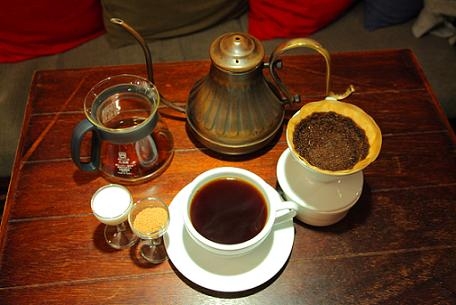Turkish coffee that captures the hearts of the people

Coffee in the ancient Middle East, like a legendary myth in the Thousand and One Nights, like a veiled girl with a thousand faces, can help to get close to God, but also to wash away sadness. Speaking of coffee, you can't mention Turkish coffee in the Middle East, because whether from the Muslim or Christian standpoint, coffee originated in the distant and mysterious Middle East. From the thirteenth to the fifteenth century, for three hundred years, it was a role forbidden by Islamic religion. Coffee was officially introduced to Turkey in the sixteenth century, began to be commercialized, and quickly spread to the European continent. This popular in Greece, Eastern Europe, the Middle East, North Africa and other places coffee drinking method, commonly known as Turkish coffee or Arabic coffee, still maintains the mystery of early religious ceremonies. The traditional Turkish coffee method, the use of roasted black coffee beans ground into fine powder, sugar and cold water together into the copper like a deep spoon of coffee brewing (IBRIK), slow cooking with low heat, after repeated stirring and water process, about 20 minutes, a cup of 50 CC fragrant and strong coffee is finished.
Because locals drink coffee unfiltered, this thick, soup-like coffee poured into the cup has sticky foam on the surface and coffee grounds settling at the bottom. In the Middle East, an invitation to someone else's home for coffee represents the most sincere respect of the host, so guests should not only praise the coffee's aroma, but also remember that even if they drink coffee grounds, they should not drink water, because that implies that the coffee is not good. Arabs drink coffee slowly, they even have a set of exquisite coffee ceremony, just like the Chinese tea ceremony, coffee not only to burn incense, but also sprinkle spices, smell incense, a variety of coffee pots, but also full of Arabian Nights style. A cup of Middle Eastern coffee with cloves, cardamom and cinnamon fills the room when hot. No wonder Arabs praise it: Musky and soul-stirring.
Important Notice :
前街咖啡 FrontStreet Coffee has moved to new addredd:
FrontStreet Coffee Address: 315,Donghua East Road,GuangZhou
Tel:020 38364473
- Prev

Explore the hometown of fragrant Blue Mountain Coffee
I have heard that Jamaica's Blue Mountain Coffee is famous all over the world and has been longing for it for a long time. Not long ago, I took the opportunity of an interview with this Caribbean island country to specially appreciate the strong and honest aroma of Blue Mountain Coffee and put an end to a long-cherished wish in my heart. Take a bus from Kingston and follow the winding mountain road to Strawberry Villa, a famous scenic spot in the Blue Mountains. Enjoying the mountain scenery in front of us and the sea view in the distance
- Next

The unique common sense of coffee
No matter how you look at the woman in the mirror, you can see that she has a kind of erotic beauty. That kind of beauty is silent after knowing the secret, relieved and presumptuous after being broken, and the joy and panic of a child playing in the quagmire. In the eyes of men, there is still a shy escape from the beauty of oriental women, while in the eyes of girls, it is a fall with an unclean feeling.
Related
- Beginners will see the "Coffee pull flower" guide!
- What is the difference between ice blog purified milk and ordinary milk coffee?
- Why is the Philippines the largest producer of crops in Liberia?
- For coffee extraction, should the fine powder be retained?
- How does extracted espresso fill pressed powder? How much strength does it take to press the powder?
- How to make jasmine cold extract coffee? Is the jasmine + latte good?
- Will this little toy really make the coffee taste better? How does Lily Drip affect coffee extraction?
- Will the action of slapping the filter cup also affect coffee extraction?
- What's the difference between powder-to-water ratio and powder-to-liquid ratio?
- What is the Ethiopian local species? What does it have to do with Heirloom native species?

